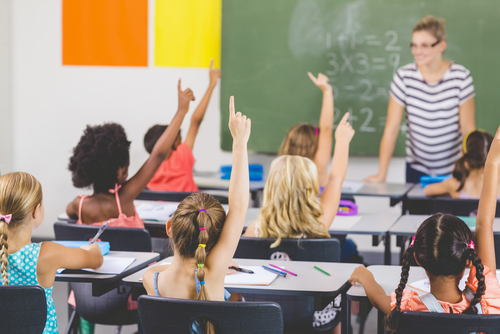As part of the new Biden-Harris Action Plan for Building Better School Infrastructure, the U.S. Department of Energy (DOE) has released a Request for Information (RFI) for a $500 million grant program from the Bipartisan Infrastructure Law for K-12 public school energy upgrades.

According to the DOE, the program will help deliver cleaner and healthier classrooms, libraries, cafeterias, playgrounds, and gyms where over 3 million teachers teach and 50 million students learn, eat, and build friendships every day. Energy upgrades to America’s public schools, including leveraging renewable power sources and electric school buses, will bring the nation closer to the president’s goal to build a net-zero economy by 2050.
“Children should be able to learn and grow in environments that are not plagued with poor insulation and ventilation, leaky roofs, or poor heating and cooling,” said U.S. Secretary of Energy Jennifer M. Granholm.
RFI FYI
Many of America’s public schools are in desperate need of energy improvements. The American Society of Civil Engineers gave the nation’s 100,000 public K-12 schools a D+ in the organization’s 2021 Report Card for America’s Infrastructure report. Dilapidated school facilities can negatively affect student learning and health, as indoor air quality problems can aggravate respiratory illnesses, reduce student and teacher attendance and performance, and increase risk of transmission of respiratory infections like COVID-19.
Energy consumption is the second-highest operational expense schools face, with a significant portion of this energy lost through leaky school walls, windows, and other inefficient equipment and systems. Districts that serve rural, high poverty, or Hispanic/Latino, African American, and Native American communities experience the greatest burden of failing or antiquated school facilities.
Public school facilities will be eligible for energy improvements that result in a direct reduction in school energy costs, including improvements to the HVAC, hot water heating, and lighting systems. In addition, funding would support any improvement, repair, renovation to, or installation in a school that leads to an improvement in teacher and student health.
The grant funding will also support additional upgrades such as renewable energy, alternative fuel vehicle (AFV) infrastructure, or the purchase or lease of AFVs.
The DOE encourages Local Education Agencies, school staff, states, local governments, energy service companies, unions, service providers, and utilities to respond to the RFI. Responses are due May 18, 2022, at 5 p.m. ET, and the full RFI is available here.
New Campaign
In a separate announcement, the DOE’s Lawrence Berkeley National Laboratory (Berkeley Lab) highlighted its leading role in a new campaign to study and improve indoor air quality in classrooms. The Efficient and Healthy Schools campaign will provide practical guidance on ventilation upgrades that can increase energy efficiency, lower costs, and improve the air at K-12 schools nationwide.
To date, 26 school districts across 16 states have joined or are prepared to join the campaign, representing over 1.5 million students in 2,600 individual schools. Among these school districts, the campaign provides recognition in four areas: efficient HVAC technologies, inspection and maintenance, ongoing monitoring and analytics, and team approach to support strategic investments.
“By promoting the Efficient and Healthy Schools program, we can pair indoor air quality and energy efficiency and reward schools for the ongoing work of keeping their buildings safe, healthy, and efficient, which is often overlooked,” said Heather Feigum, assistant director of facilities management for Cooperative Educational Service Agency 10, which supports school districts in Wisconsin.
Berkeley Lab has announced the campaign’s first round of recognition of six school districts for their best-in-class efforts in one or more areas:
- Boulder Valley School District, CO
- Charleston County School District, SC
- Columbia Public Schools, MO
- Davis School District, UT
- Greenville County Schools, SC
- Newark Board of Education, NJ
To learn more about the Efficient and Healthy Schools campaign and how to join as a participant or a supporter, click here.
